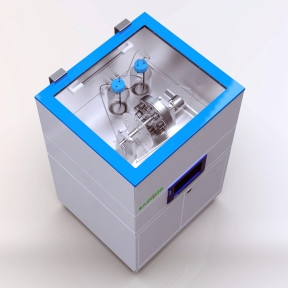The RSED embryo culture box, also known as the artificial machine uterus, is a fully enclosed dynamic culture system with multiple culture containers evenly distributed around the central axis and rotating along the horizontal axis. The system is designed with multiple functional modules such as temperature control, gas control (O2 \ CO2 \ N2), pressure control, and horizontal angle reciprocating. Thanks to the special design of the RSED rotary embryo incubator, it can not only be used for early in vitro development culture of embryos (animals), but also for low oxygen or nutrient rich environment culture, pressure culture, etc. Especially in the early in vitro development culture of embryos (animals), the RSED rotary embryo incubator extends the early development of embryos from the mother to the outside of the body by establishing a simulated uterine microenvironment, providing researchers with a more convenient way to obtain embryos and greatly facilitating subsequent experiments.
The RSED embryo incubator offers two models for users to choose from, namely RSED20S101 and RSED20S201. Among them, RSED20S101 can simultaneously culture 10 sets of samples (optional dual disk loading in the same direction, expanding the sample size to 20 sets), RSED20S201 can simultaneously cultivate 20 sets of samples (default is single disk bidirectional loading, optional dual disk bidirectional loading, expanding the sample size to 40 sets).
characteristic:
1. The operation box adopts an inner and outer double-layer structure, which is insulated by natural air to effectively avoid temperature loss;
2. The inner layer of the operating box is made of 304 stainless steel material, which is convenient for cleaning;
3. Built in UV sterilization and infrared high-temperature sterilization (optional), making it easy to thoroughly sterilize the operating space and avoid contamination;
4. The horizontal angle of the rotating cultivation platform can be automatically adjusted;
5. View and print operational briefings (optional);
6. Some functions provide customized services.
Application scenarios:
1. Simulating the uterine microenvironment for in vitro cultivation of early embryonic development;
2. By independently controlling the concentration of O2/CO2, it can be applied to anaerobic and nutrient rich environments for cultivation;
3. By adjusting the gas pressure, a culture environment with a certain pressure is established for the cultivation of cells or tissues such as cartilage, myocardium, and blood vessels;
4. Applied to dynamic 3D, dynamic suspension, or organoid culture.
The research on animal embryo engineering is of great significance in the fields of biotechnology, life sciences, and medicine. It plays a significant role in promoting the development of science and technology and improving human well-being. Through the study of gene regulation, cell differentiation, and organ formation during the development of animal embryos, the mysteries of life can be revealed, providing important clues for solving many diseases and biological problems, thus making it possible to have a deeper understanding of the mechanisms of disease occurrence and develop corresponding therapies. At the same time, animal embryo engineering research also provides new possibilities for human tissue and organ (cell) transplantation. Through stem cell technology and embryo engineering technology, suitable human organs for transplantation can be cultivated, solving the shortage problem of organ transplantation.
Please call+86 0 13862149980 for detailed information.
bio-equip.cn




